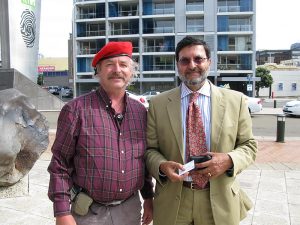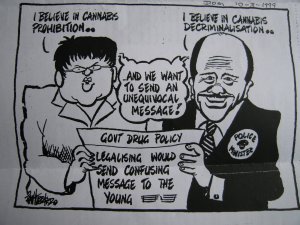Sandeep Chawla, Director, Policy Analysis and Public Affairs, UNODC
The media hullabaloo around legalisers and drug policy in the lead up to the Te Papa “Healthy

Drug Law” [mischaracterised as a] symposium was nonconstructive with National and Labour naively entrenching their positions and then Police issuing one of the most blatantly racist and ageist reports since they covered up ‘Harvey Thomas’! (NZ Police: Illicit Drug Strategy to 2010).
Why any government agency or NGO paid $850/pp to hear that unmitigated fraud (stating cannabis is bigger problem than Methamphatamine and is both a gateway drug and criminogenic) beggars me.

While the two big players at the select committee tables (and Peter Dunne with less than 1% of the party vote) remain seemingly ignorant of the implications of the unintended consequences of a criminal policy that ‘creates crime where there would be none’ – we are destined to continue the inefficiency that is so socially debilitating that it an impediment to anti-recession initiatives while making society sick, unsafe and dysfunctional…. and prisons swell at the seams.
Consider this private email to the writer from a USA State Senator; “With disbelief I read your Class D regulations for “restricted substances.” “It’s such a useful model – I still can’t believe you’ve actually set up this rational structure. Let’s see what happens when you try to get cannabis classified…” sig: Senator Roger Goodman, WA.
Yet Class D as a ‘partial prohibition’ was barely mentioned in Wellington, not by Police, not by Health sector, not by visitors, not by the NGO’s nor by the UN Office of Drugs and Crime[UNODC]… and certainly not in the context of a post prohibition paradigm.
 Image via Wikipedia
Image via Wikipedia
We shouldn’t be surprised, the only Kiwi with a “Class D” brief at Te Papa was warned off at the door by the National Drug Intelligence Bureau Chief… under duress of arrest.
The New Zealand Drug Foundation should be embarrassed.
The exclusion from the debate was in direct breach of Ottawa Charter principles and ‘good faith’ with its own participation in and organisation of the Beyond2008 UN NGO consultations that highlighted the important role of ‘drug consumer’ representation and that drug policy is a human rights/health matter above all else.
Blair Anderson
http://mildgreens.blogspot.com/
related links
 Image by Sigs66 via Flickr
Image by Sigs66 via Flickr
Law & health must co-operate to reduce drug harm Scoop.co.nz (press release), New Zealand – 18 Feb 2009 A visiting British drug expert told the Healthy Drug Law Symposium in Wellington today that health and law enforcement professionals would best protect …
Treatment smartest option for drug offenders Scoop.co.nz (press release), New Zealand – 18 Feb 2009 The New Zealand government could save millions of dollars by diverting New Zealanders with drug problems out of the court system and into the health system, …
Harsh cannabis laws defy good sense – Expert Scoop.co.nz (press release), New Zealand – 18 Feb 2009 Drug legislation and policy tend to focus too much on enforcement and tough-talk and too little on evidence about what really works, a visiting expert told …
No relaxation on cannabis laws in New Zealand: Dunne 3 News NZ, New Zealand – 17 Feb 2009 The Government will look at an open-minded and balanced approach to reducing drug use but there will be no relaxation of the laws around cannabis, …
 Image via Wikipedia
Image via Wikipedia
What alternative to the War on Drugs? Scoop.co.nz (press release), New Zealand – 17 Feb 2009 Drug control in the form of prohibition or a ‘War on Drugs’ has been a spectacular failure, a visiting American expert told a symposium in Wellington today. …
Police release illicit drugs strategy New Zealand Police, New Zealand – 17 Feb 2009 Tackling the harm caused by drug use is the key element of the Police Illicit Drug Strategy released today. The strategy, released by Deputy Commissioner …
Related articles by Zemanta
- Reform, A Political Opportunity (mildgreens.blogspot.com)
- Collapse of the Capital Markets. (mildgreens.blogspot.com)
- Drug Trade Props Up World Economy (addiction-dirkh.blogspot.com)
- Jeremy Douglas, RNZ interview. (mildgreens.blogspot.com)




